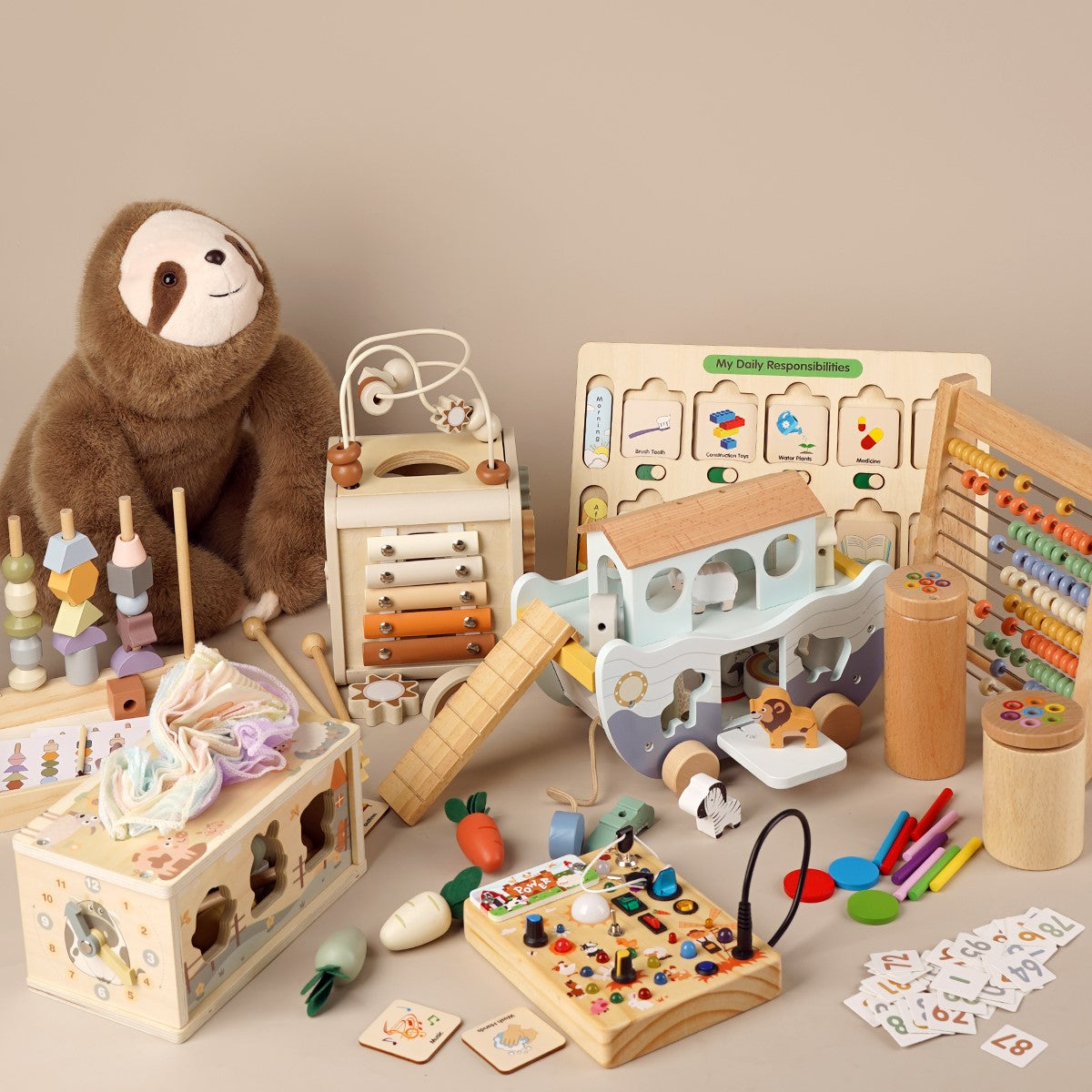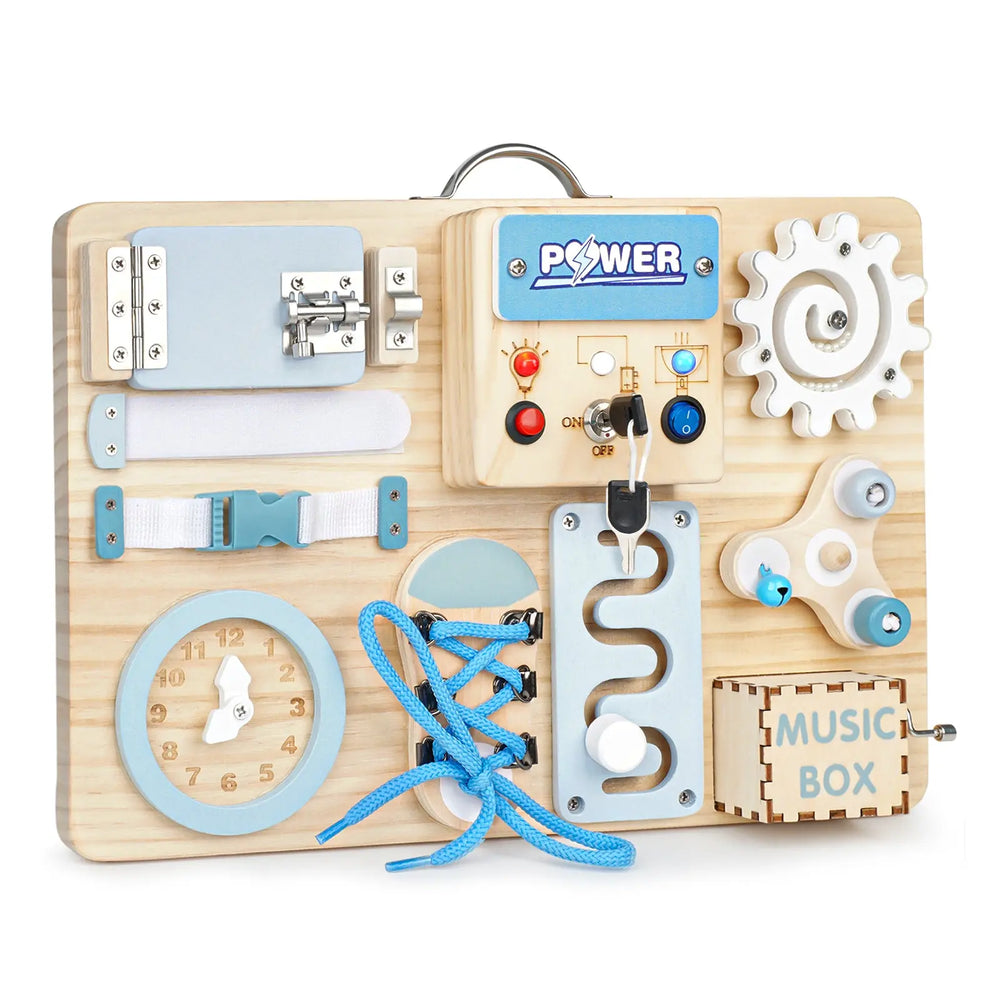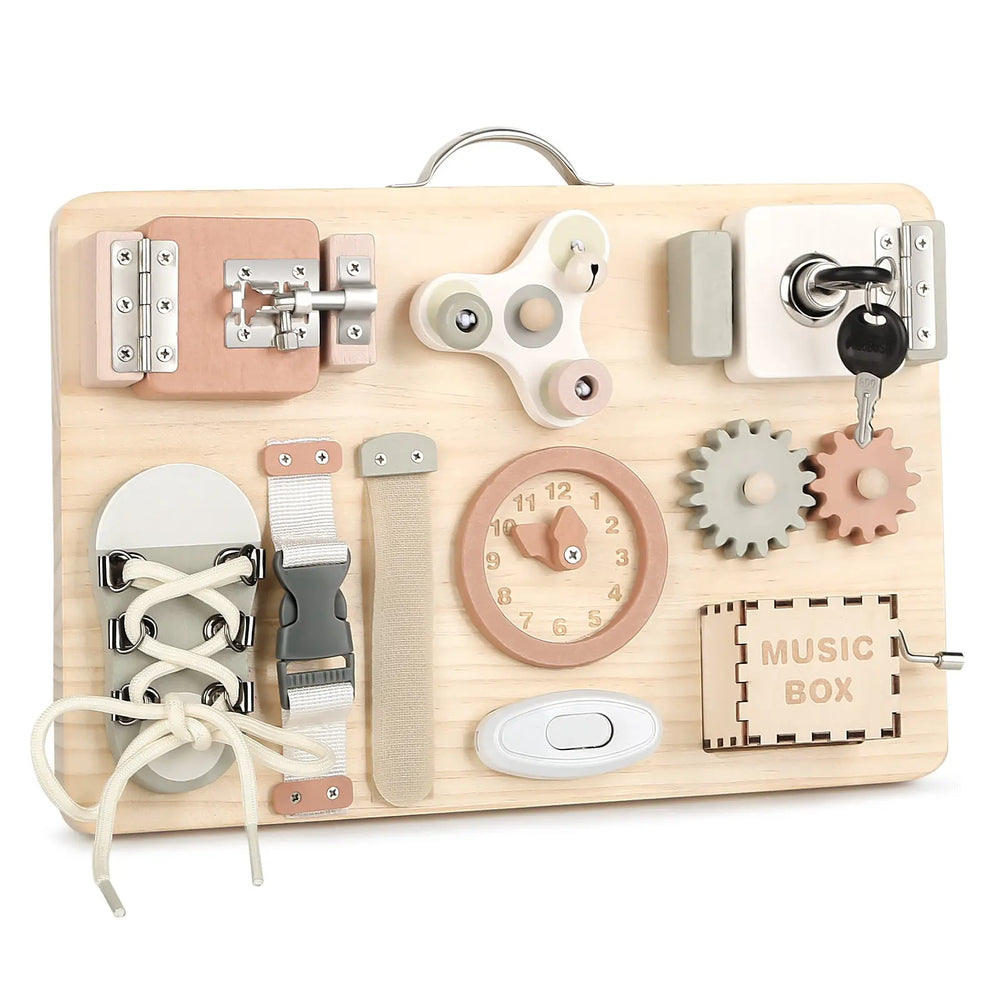Montessori Toys and Cognitive Science: Why Purposeful Play Matters
 4 Science-Backed Topics About Montessori Toys
4 Science-Backed Topics About Montessori Toys
1. Neuroplasticity & Sensitive Periods
- How montessori toy align with brain development windows (0-6 years)
- Research: University of Virginia study (2021) on sensorial material impact
- Key features: Self-correcting design, isolation of concepts
2. Executive Function Development
Brown University research on Montessori play and:
- Working memory improvements (23% vs control group)
- Cognitive flexibility development
- Impulse control milestones
3. Mathematical Mind Theory
Montessori's original research applied through:
- Bead sequencing for number sense (fMRI validation)
- Shape sorting & spatial reasoning (Johns Hopkins 2023 trial)
4. Modern Adaptation Challenges
Digital age considerations:
- Screen vs. tangible play (AAP guidelines comparison)
- Hybrid learning tools efficacy
- Cultural adaptation studies (UNICEF global report)
Why Choose Montessori Toys Over Traditional Toys?
| Feature | Montessori Toys | Traditional Toys |
| Purpose | Skill development | Entertainment |
| Materials | Natural (wood, fabric) | Plastic, synthetic |
| Complexity | Simple, focused | Often overstimulating |
| Play Style | Independent, guided | Adult-directed or passive |
| Longevity | Grows with child | Quickly outgrown |
To explore more about the differences between traditional and modern education, check out: https://joyrealtoys.com/blogs/news/montessori-education-a-different-approach-to-learning
Best Montessori Toy by Age Group
1. Infants (0-12 Months)
- Black & White Contrast Cards (stimulates vision)
- Wooden Grasping Beads (strengthens grip)
- Montessori Mobiles (encourages focus)
2. Toddlers (1-3 Years)
- Wooden Stacking Rings (hand-eye coordination)
- Shape Sorters (cognitive skills)
- Pikler Triangle (gross motor development)
3. Preschoolers (3-6 Years)
- Sandpaper Letters (pre-writing skills)
- Bead Counting Frames (math skills)
- Dressing Frames (fine motor skills)
Want to see montessori toys by Age? Click here:https://joyrealtoys.com/blogs/news/montessori-busy-boards-by-age-safe-skill-building-toys-for-10-months-to-4-years
How Montessori Toy Support Child Development
1. Fine & Gross Motor Skills
- Threading Beads → Improves dexterity
- Climbing Structures → Develops balance
2. Cognitive Development
- Puzzles & Sorting Games → Logical thinking
- Sound Cylinders → Auditory discrimination
3. Language & Communication
- Object Matching Cards → Vocabulary expansion
- Story Stones → Encourages storytelling
4. Emotional & Social Skills
- Cooperative Games → Teamwork & sharing
- Real-Life Tools → Fosters responsibility
Which Montessori Toy Are Currently Trending?
Montessori education emphasizes hands-on learning, independence, and child-led exploration. Parents and educators are increasingly turning to Montessori-inspired toys that foster creativity, problem-solving, and fine motor skills. If you’re looking for the latest trending Montessori toys, here’s a curated list of the most popular picks in 2024.
1. Wooden Rainbow Stackers
🌈 Why They’re Trending
These colorful, open-ended wooden arches encourage imaginative play, balance, and spatial awareness. Kids love using them for building bridges, tunnels, or even as pretend rainbow landscapes.
- 🔹 Best For: Creativity, fine motor skills, color recognition
2. Object Permanence Boxes
📦 Why They’re Trending:
Inspired by Montessori principles, these boxes teach babies that objects still exist even when out of sight. They drop a ball into a hole and watch it reappear—great for cognitive development.
- 🔹 Best For: Infants (6+ months), problem-solving, hand-eye coordination
3. Wooden Counting Peg Boards
🔢 Why They’re Trending:
Math meets fine motor skills! These peg boards help children grasp counting, patterns, and number recognition through tactile play.
- 🔹 Best For: Toddlers & preschoolers, early math skills, concentration
4. Montessori Busy Boards
⚙️ Why They’re Trending
Packed with latches, zippers, and buttons, busy boards keep little hands engaged while teaching essential life skills.
- 🔹 Best For: Fine motor development, practical life skills (1-4 years)
5. Balance Boards (Wobble Boards)
⚖️ Why They’re Trending:
A favorite for active kids, these boards improve balance, core strength, and can even double as a bridge or slide in pretend play.
- 🔹 Best For: Gross motor skills, sensory play (2+ years)
6. Sensory Play Kits (Rice, Sand, or Water Tables)
💦 Why They’re Trending
Montessori encourages sensory exploration, and these kits provide endless fun with scooping, pouring, and texture discovery.
- 🔹 Best For: Sensory development, focus, calming play
7. Wooden Shape Sorting Puzzles
🧩 Why They’re Trending
Unlike plastic alternatives, wooden puzzles offer durability and a natural feel. They help with shape recognition and problem-solving.
- 🔹 Best For: Cognitive skills, hand-eye coordination (1-3 years)
8. Montessori-Inspired Building Blocks
🏗️ Why They’re Trending
Simple, unpainted wooden blocks encourage open-ended construction and creativity without overwhelming distractions.
- 🔹 Best For: Spatial reasoning, imaginative play (1-6 years)
Choosing Montessori Toy: Which Brands Are Recommended?
Choosing Montessori toy means looking for items that support a child's independence, concentration, and development through purposeful activity. While the specific brand is less important than the qualities of the toy, certain manufacturers consistently produce materials aligned with the Montessori philosophy.
JOYREAL: Thoughtful, Nature-Inspired Play for Curious Minds
At Joyreal toys craft minimalist wooden toys designed to spark imagination and nurture a child’s innate curiosity.
-
Celebrating Open-Ended Exploration – No "right" or "wrong" way to play
Honoring Natural Materials – Sustainably sourced wood, soothing textures, and organic shapes - Encouraging Child-Led Discovery – Simple designs that grow with a child’s evolving creativity
The JOYREAL Difference
- Less Structured, More Possibility – Invites storytelling, experimentation, and sensory-rich learning.
- Designed for Deep Engagement – Calming, screen-free play that builds focus and independence.
- A Natural Extension of Montessori Values – Perfect for homes and classrooms seeking simplicity.
Ideal for Parents & Educators Who Value:
- Unhurried, imaginative play
- Eco-conscious, heirloom-quality toys
- Toys that "disappear" into the background, letting creativity shine
Which brands suit you best? Click here to find out: Which of These Top 4 Brands Matches Your Child's Learning Style?
Maybe it will be helpful for you:
Recent Post

From the Beach to the Bath: One Summer Toy Kids Use All Season
Which Sand Toys Help Kids Focus—and Which Ones Are Truly “Buy Once,...

Montessori Toys for 1 Year Olds: The Right Toys for Early Development
Do 1-Year-Olds Really Need Toys — or Just the Right Ones? When your...

Editor’s Picks: Best Kids Gardening Sets & Beach Toy Sets for Summer
Summer is the perfect season to get kids outside — digging in the g...

Busy Board or Communication Device? A Joyreal Guide for Autistic Toddlers
One Question Every Autism Parent Asks Every autism parent faces thi...

When Are Busy Boards Not Enough for Autism?
For many autistic children — especially those who are non-verbal or...

Busy Board for 1 Year Old vs 2 Year Old: What’s the Difference?
Busy boards have become one of the most popular Montessori-inspired...

How AAC Devices Help Autistic Individuals Manage Overwhelm
Autistic people can feel overwhelmed when their brains receive mor...

DIY Busy Board for Toddlers: What to Add
Why Busy Boards Are Every Toddler’s Favorite Toy Every parent knows...

Do Wooden Push Walkers Really Help Babies Walk?
Every Parent’s Fear: “Will My Baby Walk Safely?” That moment your b...

Which Montessori Music Toys Are Best for Toddlers Ages 1–3?
Music is one of the earliest ways toddlers explore the world.Before...










